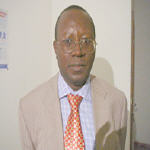
An independent autopsy into the death of a human rights activist in the Democratic Republic of Congo has not been able to establish how he died.
But a team of international doctors say Floribert Chebeya's death last month was most likely heart-related.
His body was found bound and gagged in the back of his car after being called to a meeting with the police chief which did not take place.
In his two-decade career, he regularly received threats for his work.
Mr Chebeya, who headed the organisation Voice of the Voiceless, was known to have an existing heart problem.
His death at 47 led to calls for an international investigation and a joint Congolese and Dutch forensic team conducted the autopsy on 11 June.
"The autopsy could not show with certainty the cause of death," a joint statement said, Reuters news agency reports.
However, they did note superficial cuts and some bleeding around the wrists, forearms and the legs caused by an external source.
"Although there were signs of violence these were minor," Pim Volkers, the director of Verilabs, the Dutch company that carried out the autopsy, told the BBC's Network Africa programme.
"The pathologist does not feel that this was the cause of the death of Mr Chebeya," he said.
They occurred a short time - between 10 minutes and 30 minutes - before Mr Chebeya's death, he said.
"There were signs that he could have been cuffed at one stage - there are no signs of very severe beatings.
"What Mr Chebeya was suffering from were conditions of the heart which suggest that these were congenital conditions and that has led to his death," he said.
On the day he disappeared, Mr Chebeya sent a text message to his wife saying that he was at the police headquarters for the meeting, but was not heard from again.
Both the police and Voice of the Voiceless have confirmed that the meeting with police chief John Numbi did not take place.
Voice of the Voiceless say he had sent a letter to Mr Numbi earlier this year asking him to improve detention conditions in prisons.
Mr Chebeya had received a letter of acknowledgment the week before his death setting up the meeting.
Related articles
- • UK Suspends Financial Aid to Rwanda Over M23 Rebellion (February 25, 2025)
- • Rwanda-Backed M23 Rebels Summarily Executed Children in Bukavu, UN Reports (February 19, 2025)
- • DR Congo Delays Results of December Election (January 6, 2019)
- • Jean-Pierre Bemba Returns to DR Congo (August 1, 2018)
- • At least 30 dead after massacres in Ituri (March 2, 2018)
- • Botswana Urges Joseph Kabila to Step Down (February 26, 2018)
- • No elections in DR Congo in December without electronic voting machines: INEC (February 13, 2018)
- • DR Congo reach final of African Nations Championship (February 3, 2016)
- • Peacekeepers, Congo Army to Resume Joint Fight Against Rwandan Rebels (January 28, 2016)
- • Political tensions 'running high' in DR Congo ahead of 2016 elections (October 7, 2015)
- • UN Report Blames Ugandan Islamists for 237 Killings in DR Congo (May 14, 2015)
- • Rights Groups: DR Congo Must Free Pro-democracy Activists (April 13, 2015)
- • Police Open Fire on Crowd Protesting Election Law Change (January 19, 2015)
- • Denis Mukwege Wins Sakharov Prize 2014 (October 21, 2014)
- • Senior UN officials urge Brazzaville to halt expulsion of DR Congo nationals (May 26, 2014)
- • 15 dead in football match stampede in Kinshasa (May 12, 2014)
- • Security Council extends UN mission, intervention force in DR Congo for one year (March 28, 2014)
- • Death toll in Lake Albert boat accident rises to 108 people (March 24, 2014)
- • M23 Rebels Kill, Rape Civilians in Eastern Congo: Human Rights Watch (July 22, 2013)
- • UN Security Council Condemns Latest M23 Attacks, Extends Sanctions on Rebels (November 28, 2012)
- • Thousands of Women March Against M23 Rebels in Kinshasa (November 24, 2012)
- • Protests Against M23 Rebels, Government and UN Spread (November 22, 2012)
- • Thousands Protest M23 Capture of Goma, Turn on Government and UN (November 21, 2012)
- • U.S. Treasury Department Sanctions M23 Rebel Leader (November 13, 2012)
- • U.S. Tells Rwanda to Stop Supporting Rebels in DR Congo (July 2, 2012)
- • Kagame Is A Problem for The U.S. and The U.K. (June 23, 2012)
- • Police Investigate Former Prime Minister for Corruption (May 14, 2012)
- • TP Mazembe Reach Sixth Consecutive Champions League Group Stage (May 13, 2012)
- • Kony 2012 video director detained (March 16, 2012)
- • Opposition Supporters Step Up Attacks on Congolese Officials Abroad (February 28, 2012)







